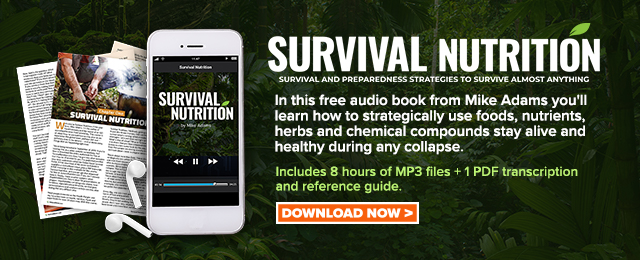
Use of a big fork may make you eat less
Sunday, July 31, 2011 by: Mary West
Tags: forks, serving sizes, health news
- The hidden war above: Chemtrails, HAARP and the battle for planetary control
- Florida Senate passes bill banning geoengineering and weather modification and Governor DeSantis has indicated it will become law
- Hidden toll: Federal secrecy shields wind industry's eagle deaths to protect land-hungry turbines that yield minimal power
- George Floyd double standard: White 4.0 athlete slaughtered by Black teen-media silent
- Putin launches largest military call-up since 2011 amid escalating tensions
- 7 Must-have multi-functional survival tools for every prepper
- Chief Justice Roberts faces scrutiny over ties to anti-Trump legal strategist Norm Eisen
- Aerosolized bioweapons? Strange “diploid biomasses” falling out of the sky in Florida captured under the microscope
- CLOT SHOT PLANDEMIC UNFOLDING: Fibrous, rubbery clots caused by covid injections have prion-like seeding activity
- Idaho Gov. Brad Little vetoes Medical Freedom Act
- ChatGPT’s cowardly DOUBLE STANDARD: Bowing before Islam while mocking Christianity
- Global pedophile ring “Kidflix” shut down in landmark Europol operation
- Science unlocks nature’s potential: How natural compounds may support individuals with Autism Spectrum Disorder (ASD)
- The Trump effect: RECORD LOW in illegal border crossings signals a new era of border security
- DEATH by VACCINE or face PRISON time: Canadian Freedom Convoy leaders CONVICTED for protesting forced vaccination during the Covid Plandemic
- Deep State bureaucrats defy Trump’s DEI crackdown with secret “rebranding” scheme
- Top German general admits that CONSCRIPTION is “absolutely” necessary to combat Russia
- Global markets plunge as China retaliates with 34% tariffs on U.S. goods
- Newly released JFK files reveal Pentagon's role in creating Lyme disease and covid in the same lab
- European Court of Justice: Healthcare professionals who promoted or administered COVID-19 vaccines are CRIMINALLY LIABLE for any harm caused
- Aerosolized bioweapons? Strange “diploid biomasses” falling out of the sky in Florida captured under the microscope
- Oncologist warns of ‘terrifyingly aggressive’ cancers in children, linked to immune suppression from COVID vaccines
- Britain’s descent into police state censorship: Parents raided for questioning their daughter’s school system online
- Analysis: The coming economic collapse, a mass uprising and Trump's three secret weapons to halt the growing revolt
- Utah governor allows ban on LGBT pride flags in public buildings and schools, will take effect without his signature
- Kiss Your Genetic Privacy Good-Bye! 23andMe Gets Green Light to Sell Your Intimate Genetic Details to Anyone They Want
- FBI imposed gag order on agents to silence Hunter Biden laptop truth before 2020 election, new chat logs reveal
- The Health Ranger releases “Vaccine Zombie” song and music video, using AI-animated zombies for the music video
- DARPA: The shadowy innovator behind the world’s most advanced military technologies
- Mike Adams releases country western hit single: Goin’ Back in Time is Comin’ Home
- “Project Aldrin”: Senate probes Meta's alleged censorship dealings with China
- When antibiotics are unavailable, natural ANTIMICROBIAL compounds become essential first line defenses against infection
- AI-powered forecasting model proves more accurate than traditional systems at predicting the weather
- German researchers find link between mRNA vaccines and GENETIC CHANGES that precede CANCER and AUTOIMMUNE DISORDERS
- Dr. Mary Talley Bowden drops bombshells about children being permanently damaged by mRNA jabs during Tucker Carlson interview
- Ancient kitchen secrets REVEALED: How garlic, ginger and green onions fight cancer and heart disease
- Newly released JFK files reveal Pentagon's role in creating Lyme disease and covid in the same lab
- California's social media censorship law struck down: A victory for free speech or a threat to online safety?
- The Health Ranger releases “Vaccine Zombie” song and music video, using AI-animated zombies for the music video
- Dr. Mike Yeadon releases 15-minute testimony - WATCH - about genocidal intent of COVID “vaccines”
- EPA advisor admits the agency is funneling billions to climate groups ahead of Trump’s return to White House
- Rep. Nancy Mace introduces bill to ban biological males from female facilities on federal property
- Florida takes a stand: DeSantis proposes permanent ban on mRNA vaccine mandates
- Sugarcane extract superior to cholesterol-lowering drugs?
- Survival 101: Effective EMF blocking techniques
- Mike Adams releases country western hit single: Goin’ Back in Time is Comin’ Home
- OpenAI whistleblower who dissented against how the company trained ChatGPT found dead
- Attorney and TikTok influencer explains how he was offered hundreds of dollars to make false claims about Trump, Republicans
- CONSERVATIVES SOUND THE ALARM: Big Pharma and the Left trying to force $32 billion money grab from America’s seniors into year-end spending deal
- Pilots report mysterious lights 'moving at extreme speeds' across Oregon skies
- Trump expected to choose Kelly Loeffler as his agriculture secretary even though she was caught INSIDER TRADING during COVID
- Marketing director responsible for WOKE Jaguar rebrand is also an LGBT activist who supports Black Lives Matter
- Unpacking the Lies That We’ve Been Fed – new song and music video released by Mike Adams, the Health Ranger
- Poll: Majority of Ukrainians want peace negotiations to end war with Russia
- Red Cross issues warning to stop blood plasma donations from vaccinated people
- Scientists confirm: GENIUS brain function can be spontaneously unleashed in humans without any apparent cause
- EPA advisor admits the agency is funneling billions to climate groups ahead of Trump’s return to White House
- HYSSOP: What research reveals about the health benefits of this ancient holy herb
- Two containers with completed ballots fall out of truck in Florida
- Fully vaccinated about to see “tsunami” of illness and death, warns virologist
- Global leaders unite to clamp down on “misinformation” with UN-backed Cascais Declaration
- BREAKING: 2025 NDAA authorizes mandatory military draft of WOMEN across America… as Pentagon pursues global NUCLEAR war with both Russia and China at the same time
- Newly released JFK files reveal Pentagon's role in creating Lyme disease and covid in the same lab
- Michael Yon warns of a ZIONIST TAKEOVER in Trump’s second administration
- BOMBSHELL: DNA testing kits are a SCAM to develop ethnic-specific bioweapons
- Ozempic and Wegovy weight loss drugs are injectable LIZARD VENOM PEPTIDES that may unleash a devastating wave of organ failure… side effects align with symptoms of SNAKE BITES
- The Health Ranger releases “Vaccine Zombie” song and music video, using AI-animated zombies for the music video
- Israeli soldiers accused of even more torture and abuse in the West Bank
- These 13 countries just signed an agreement to engineer a global FAMINE by destroying food supply
- NASA admits that climate change occurs because of changes in Earth’s solar orbit, and NOT because of SUVs and fossil fuels
- RFK Jr. clears key hurdle: Sen. Susan Collins backs controversial HHS nominee, signaling a new era for health policy
- Sermon 30: How Jesus reveals Caesar’s FAKE CURRENCY and FALSE AUTHORITY
In the investigation, University of Utah scientists doubling as waiters, monitored patrons at an Italian restaurant for two days as they ate with a fork that was either 20% larger or 20% smaller than a standard-sized fork. The quantity of food consumed was determined by weighing the plates before they were given to customers and again, after they were returned to the kitchen.
Patrons who used a big fork to attack a plate served with large portions were found to eat much less: New York Daily News reports. The results differed, however, when patrons were served smaller portions. In these cases, fork size had no influence on the amount of food eaten. Researchers postulate that the difference could be due to the fact that when people eat from a plate piled high with food it is harder to gage the quantity of food consumed.
As provocative as the results may seem, it is not the first time research shows that visual cues may play a role in governing the amount of food people eat. Earlier studies reveal that big plates appear to cause people to eat more.
In analyzing the current study's results, researchers concluded that a small fork provides an impression that little progress is being made in satiating hunger, which leads to more consumption. Coauthor Arul Mishra explains that feelings of satiation involve a time lag, during which diners may focus on visual cues to assess how much they have eaten.
The authors elaborate that our grandmothers advised us to eat small bites and chew well to avoid overeating. They point out that given the fact that people lead busy lives and frequently eat in restaurants, if they are not chewing longer, then eating with a bigger fork can aid in curtailing overconsumption.
HealthDay notes that the big fork was only beneficial in a restaurant setting. Researchers explain that eating at home may involve different goals regarding hunger satiation than eating in a restaurant.
Investigators suggest that overeating may be avoided if people learn to recognize and understand hunger cues and the quantity of food they should eat.
http://consumer.healthday.com/Article.asp?AI...
http://www.nydailynews.com/lifestyle/2011/07...
http://www.dailymail.co.uk/sciencetech/artic...
http://www.cbsnews.com/8301-504763_162-20080...
About the author
Mary West is the creator of a natural healing website where she focuses on solutions to health problems that work without side effects. You may visit her website to learn more at http://www.alternativemedicinetruth.com.Forks at FETCH.news
Get independent news alerts on natural cures, food lab tests, cannabis medicine, science, robotics, drones, privacy and more.
Take Action: Support Natural News by linking to this article from your website
Permalink to this article:
Embed article link: (copy HTML code below):
Reprinting this article:
Non-commercial use OK, cite NaturalNews.com with clickable link.
Follow Natural News on Facebook, Twitter, Google Plus, and Pinterest
Science News & Studies
Medicine News and Information
Food News & Studies
Health News & Studies
Herbs News & Information
Pollution News & Studies
Cancer News & Studies
Climate News & Studies
Survival News & Information
Gear News & Information
News covering technology, stocks, hackers, and more



"Big Tech and mainstream media are constantly trying to silence the independent voices that dare to bring you the truth about toxic food ingredients, dangerous medications and the failed, fraudulent science of the profit-driven medical establishment.
Email is one of the best ways to make sure you stay informed, without the censorship of the tech giants (Google, Apple, Facebook, Twitter, YouTube, etc.). Stay informed and you'll even likely learn information that may help save your own life."
–The Health Ranger, Mike Adams












































